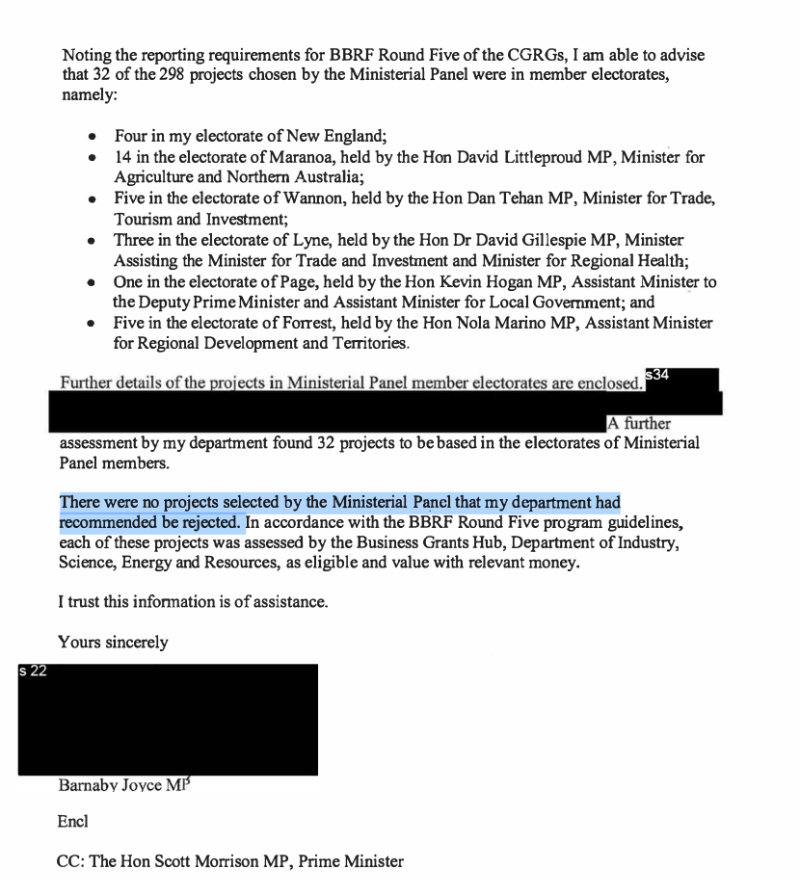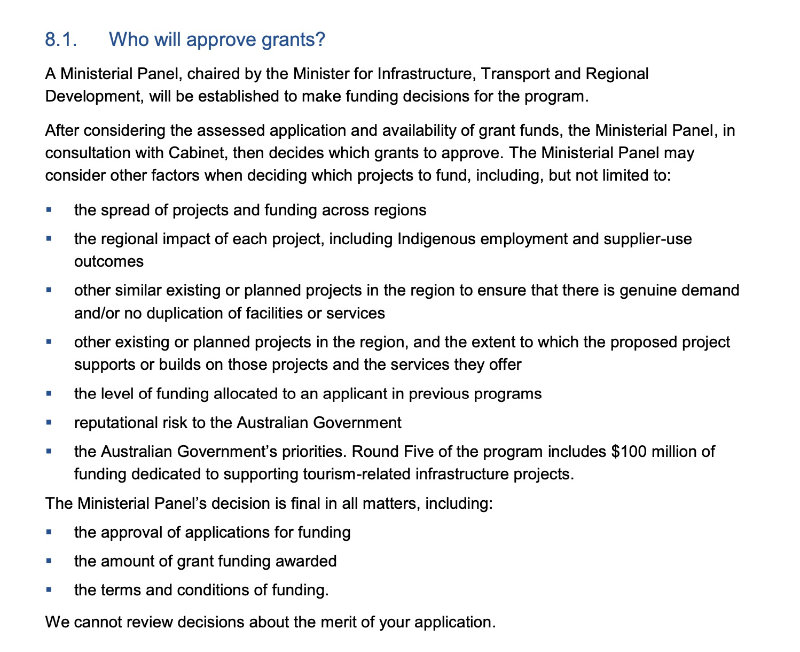We don’t pat ourselves on the back but MWM placed a mole (totally legit) inside Canberra and sniffed out some rotten deals. Jommy Tee continues his exposé of the rorts for the regions.
It’s election season. Vote-buying time. And it’s always instructive to see the way it’s done; the way those sausages are being made.
So how good’s Senate estimates? Bloody good.
Bloody good at exposing the bad smell wafting over the Building Better Regions Fund.
The most recent Senate estimates confirmed that something rotten lies in the administration and decision-making of the fund. The awarding of grants is opaque – hidden by cabinet-in-confidence and the discretionary power the ministerial panel applies.
The Senate also heard that Round 6 of the BBRF (worth $250 million) had closed and it would be touch and go whether the grants would be announced ahead of caretaker period commencing or ahead of the election.
A number of questions on the fund were asked by Labor’s Senator Murray Watt. The questions were based on material raised in previously published articles by Michael West Media.
To cut to the chase. The program is gamed by the government for political purposes. To date $1.4 billion has been awarded under the program, $300 million in Round 5 alone, with next to no accountability.
A stench surrounds it, like it does for a range of other corrupted government programs: Safer Communities Fund, Commuter Car Park Fund, Sports Infrastructure Grants, and Female Facilities and Women’s Safety Stream, and Community Development Grants.
We previously revealed how it was easier to get a grant in BBRF Round 5 if you ranked last than ranked first. The extent of ministerial meddling in “awarding” grants in rounds three and four has also been exposed by MWM.
We have also previously highlighted how a small definitional change (essentially not making any recommendations to the panel, instead submitting every eligible applicant) would result in the ministerial panel being able to claim they did not reject any project recommended by the department.
Ministers have previously failed to respond to our questions. So it was pleasing that the issues we raised were being followed-up in Estimates.
Officials from the Department of Infrastructure – which administers the program – confirmed that was indeed the case and that the panel reported zero rejections against departmental advice. This was also confirmed through an FOI.

When questioned by Watt, the department volunteered it instigated the change – “continuous improvement” being the new catchphrase for a lack of accountability.
It is hard to imagine that the ministerial panel had turned into a paragon of virtue for Round 5 when in the past it had been an unrepentant sinner – intervening 112 times in Round 3 (a pre-election grant round) and 49 times in Round 4.
In fact the ministerial panel intervened more in Round 5 than it did in previous rounds.
At least 83 applications that scored poorly with barely a pass mark and which were ranked last, second last or third last in the Infrastructure and Tourism Streams received grants.
Yet there were a total of 131 applications that scored higher that were not considered worthy enough by the ministerial panel.
Officials also confirmed that unsuccessful applicants are not notified of their departmental score/ranking and only provided “general feedback” and their application “was assessed as eligible and value for money, but not selected by the [ministerial] panel”.
We have confirmed this with a number of unsuccessful applicants.
General feedback and not informing applicants of their score is a convenient “get out of jail” card for the panel.
After all, who would want to tell high-ranking applicants that their score meant nothing and hence they didn’t get a grant. Nor would they want to be told that instead the panel awarded grants to applicants ranked last.
This actually occurred in both the Infrastructure and Tourism streams of BBRF Round 5.
Yet unsuccessful applicants would be blissfully unaware as they are not advised of their score or ranking.
There seems to be no accountability for applicants but plenty of “continuous improvement” for the ministerial panel when they are given feedback.
A further tool that enables ministerial manipulation is the program guidelines.
The guidelines provide a wide range of discretionary factors enabling the panel to intervene at will.
The ministerial panel takes full advantage of this – based on Rounds 3, 4 and 5 the departmental scoring appears to be completely ignored.
The factors are so wide that at least 10 Canberra Convoys could easily drive through them.

Courtesy of an FOI request it is now a matter of public record that the ministerial panel for round five, as per previous rounds, gorged themselves, awarding 32 projects in the electorates of ministerial panel members. The value of those grants totalled $44 million.
The vast bulk of the gorging occurred in the Infrastructure and Tourism streams: $43 million across 19 projects.
As we have seen the departmental scores of all projects that went to the ministerial panel, we can also report that of those 19 projects, 10 ranked either last, second last or third last based on departmental scores.
A further five projects, had the program funding been based and distributed on merit, would have been extremely unlikely to be funded.
Maranoa – the electorate of panel member David Littleproud – fared particularly well, wolfing down 14 grants. Nine of these grants were in the Infrastructure and Tourism streams and six of these grants scored poorly, ranking either last, second or third last on departmental scores.
It appears panel members scraped the bottom of the barrel in order to satiate themselves.
Then again that seems par for the course for the Building Better Regions Fund.
How good’s Senate estimates? Bloody good … but hopefully not as good as the Australian National Audit Office report into the program due in June, after the election.
As for Round 6, watch this space.
Jommy Tee is a long-time career public servant, having worked in the policy development field for 25+ years as well as an independent researcher interested in politics, current affairs, and Nordic noir.

